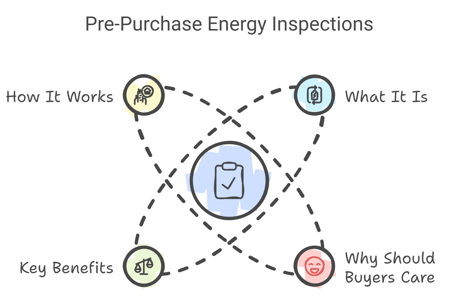Don't Buy Blind: Why a Pre-Purchase Energy Inspection is Essential
Maximising Home Value and Unlocking Savings: The Essential Benefits of a Pre-Purchase Energy Inspection for Home Buyers. Know Before You Buy to Make Confident Decisions and Avoid Costly Surprises.
Yann Guihard and Rainer Schütz Sauer
10/22/20246 min read
When you're in the process of buying a house, the excitement can sometimes cloud important decisions. While factors like location, design, and structure tend to dominate the conversation, one crucial aspect is often overlooked—energy efficiency. Failing to consider the energy performance of your future home can lead to higher utility costs, disappointing indoor temperature comfort, unexpected upgrades, and even a decrease in long-term property value.
A Pre-Purchase Energy Inspection offers homebuyers the opportunity to assess a property's energy efficiency before committing, similar to how a building inspection or pest inspection ensures the property is structurally sound and free of infestations. This type of energy evaluation provides crucial insights that can impact your financial planning, comfort, and even your negotiation leverage.
What is a Pre-Purchase Energy Inspection?
A Pre-Purchase Energy Inspection evaluates how efficiently a home consumes energy by reviewing key components such as insulation, windows, HVAC systems, and other fixed appliances. Much like a property inspection or termite inspection, which ensures the home’s structure and safety, an energy inspection reveals how well the property performs in terms of energy consumption, temperature comfort and future costs.
For any homebuyer looking to make a smart investment, this inspection is a must. It’s not just about avoiding future expenses—it’s about making the best possible decision upfront.
As energy costs rise and environmental sustainability becomes more important, energy-efficient homes are becoming increasingly valuable. Buyers are starting to prioritise energy efficiency, and waiting until after the purchase to address energy issues can be costly.
By conducting a Pre-Purchase Energy Inspection now, you can secure several advantages, from reducing unexpected costs to making your home more environmentally friendly while increasing its long-term valuation potential. Below are the key reasons to consider it before signing on the dotted line.
Better Negotiation
Energy inefficiencies can drive up utility bills and future upgrade costs. By conducting a Pre-Purchase Energy Inspection, you’ll know exactly where the property stands, energy-wise. You will get an estimate of the ongoing energy bills, but also cost estimates for suggested home improvements. Similar to using a building and pest inspection to negotiate a better deal, an energy inspection gives you solid evidence to negotiate a lower price or ask the seller to make improvements before finalising the deal. Many buyers overlook this step, but those who use it can save thousands of dollars.
Finance Through Your Mortgage
Knowing what energy upgrades are necessary upfront allows you to plan them into your mortgage. If you identify key areas for improvement—like insulation, window replacements, or upgrading HVAC systems—these can be financed along with your mortgage rather than having to pay out-of-pocket later. This spreads the cost over time and allows you to finance these energy-saving improvements at a lower interest rate than personal loans. For example, financing a $20,000 upgrade through your mortgage could save you up to $2,000 compared to using a personal loan later.
Resale Value Potential
From 2025, properties energy ratings will start being disclosed at the time of sale in NSW, with the other Australian states likely to follow suit. A property valuation will then become more and more correlated to its energy rating, as has been observed in all other jurisdictions around the world where energy ratings are disclosed. That means, energy-efficient homes will increase in valuation much more than poor performing ones. In fact, energy-efficient homes across Australia already command an average price premium of $112,000 for houses and $70,000 for units (based on Domain's Sustainability in Property 2024 report). Purchasing a highly efficient property or upgrading a less efficient one is therefore a savvy long-term investment.
Compare Houses for Better Decision-Making
Energy inspections, like a property inspection, make it easier to compare homes. If you're deciding between two or three properties, the energy performance of each can become a decisive factor. A house that looks more affordable initially may come with hidden energy costs, while a slightly higher-priced home could save you money in the long run through energy efficiency. This deeper analysis of each property helps you make the best choice, ensuring that your investment aligns with both your immediate budget and long-term financial goals.
Key Benefits of a Pre-Purchase Energy Inspection
Significant Cost Savings
Plan for Future Upgrades
An inspection allows you to plan for future energy-saving upgrades. Whether it's installing solar panels, adding insulation, or upgrading appliances, a detailed report gives you the insight you need to prioritise which improvements will bring the greatest return on investment. This long-term planning not only enhances comfort but also increases your home's value, just as a building inspection helps ensure structural integrity and safety.
How It Works
The worst feeling for any homebuyer is moving in and discovering that the house is too cold in the winter or unbearably hot in the summer. Energy issues like poor insulation or inefficient windows often result in discomfort and high energy bills. A Pre-Purchase Energy Inspection helps you identify these potential problems in advance, so you won’t be surprised by costly fixes after the fact, similar to how a termite inspection can prevent costly future damage.


A well-insulated, energy-efficient home provides consistent temperatures year-round, reducing the need to constantly adjust your thermostat. This means not only saving money but also enjoying a more comfortable living environment, regardless of the season.
Why Buyers Should Act Now
Inefficient homes often come with high energy costs, which can add up to thousands of dollars annually. For example, an inefficient property could add up to $3,000 annually to your energy bills. A Pre-Purchase Energy Inspection identifies potential issues like poor insulation, outdated HVAC systems, or inefficient windows, giving you an opportunity to address these concerns before committing to the purchase. Armed with this information, you can better anticipate utility costs and potentially save a significant amount of money.
Avoid Unpleasant Surprises
Long-Term Confort
The Pre-Purchase Energy Inspection process is incredibly straightforward and simple:
A certified energy expert visits the home during the pre-purchase inspection and evaluates key factors like insulation, windows, roof, fixed appliances, and heating systems.
The inspection takes about 30 minutes.
You’ll receive a comprehensive, easy-to-read report by the next business day, detailing the home's energy performance, identifying areas for improvement, and estimating potential savings and upgrade costs.
It’s a simple and easy process that fits seamlessly into your home-buying routine, similar to organising a building and pest inspection. In fact, both inspections can be carried out concurrently in all convenience.
Schedule Your Inspection Today
Buying a home is one of the biggest financial decisions you’ll ever make. Ensure it’s also a smart investment by scheduling a Pre-Purchase Energy Inspection. With this service, you’ll have peace of mind knowing your new home will be energy-efficient, comfortable, and cost-effective—just like how a building and pest inspection helps you feel secure about your property purchase. Book your inspection with Alpaca Solutions today and start saving!


FAQ - Frequently asked questions
1. What is a Pre-Purchase Energy Inspection?
It's an assessment that evaluates the energy efficiency of a home before you buy it, identifying expected temperature comfort levels, energy bills, potential savings and opportunities for improvement.
2. How long does the inspection take?
The inspection usually takes about 30 minutes, with the report provided the next business day.
3. What does the inspection cover?
The inspection evaluates key areas of the home’s building envelope (walls, windows, roof, floors, insulation) as well as the fixed appliances (such as the hot water system, heating and cooling appliances, cooktop, lighting, etc) and on-site renewables such as solar panels, to give a complete picture of the home’s energy use.
4. Can the inspection help with negotiation?
Yes! If energy inefficiencies are identified, you can negotiate a lower price or ask the seller to make necessary upgrades before closing, just like a building inspection might reveal areas needing repair. For example, an inefficient property could add up to $3,000 annually to your energy bills, which you would need to consider into your overall budget.
5. Why should I get an energy inspection if I’m already getting a standard home inspection?
A standard property inspection looks at the structure and safety, but doesn’t evaluate energy efficiency features. The energy inspection ensures you're prepared for future utility costs and comfort. The energy performance of a home can also impact its long-term valuation potential.
6. How is the inspection report structured?
The report provides an overview of the home's energy efficiency features, assesses the expected thermal comfort and ongoing utility bills, identifies opportunities for improvement, and estimates the costs of potential upgrades.
7. Can this inspection increase the resale value of my home?
Yes! Homes with better energy performance often sell for higher prices, and knowing where to make upgrades can increase both comfort and property value. In fact, data shows making energy improvements to your property can increase its value by up to 10%. According to Domain's Sustainability in Property 2024 report, energy-efficient homes across Australia command an average price premium of $112,000 for houses and $70,000 for units. Plus, they attract 16.7% more buyer interest and sell 4% faster.


YOUR HOME ENERGY PARTNER
© 2024 Alpaca Solutions. All Rights Reserved. | Privacy Policy | Cookie Policy | Terms & Conditions
REQUEST A CALL BACK
Fill in your details and one of our experts will call you back.
Alpaca Solutions orchestrates the energy efficiency upgrades for your home and is your single point of contact from initial assessment to completion of works.
We are based in Sydney and are able to deliver projects Australia-wide.
